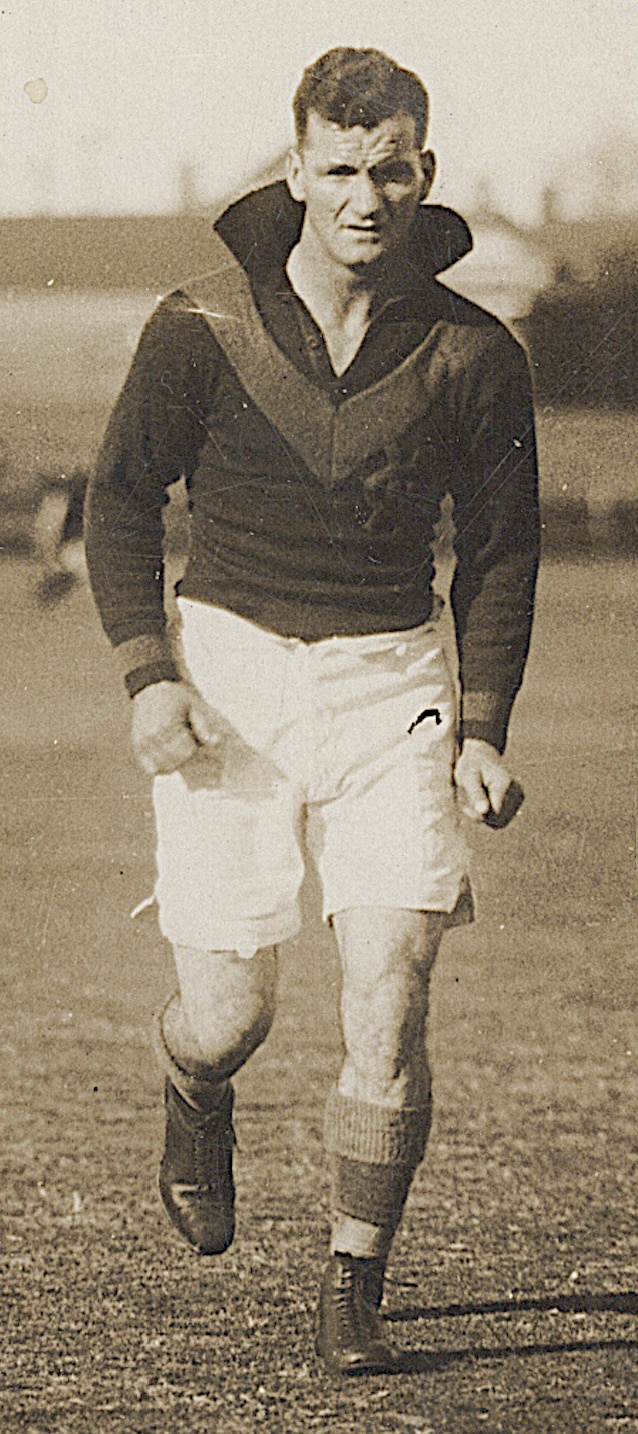The Hawthorn and Kew Express reported on October 3, 1902 that at the HFC Annual Smoke Night, C Boxhall was awarded Mr Piggott’s medal for Best All-Rounder Play. Other awards presented were Best Place Play (Mr Croft’s Medal) to J Coucher, Best Follower, J Poole and Best Attendance to Training, W Trott.
Unfortunately, few detailed records were kept for the presentation of playing awards until 1933 when the Club’s Annual Report recorded, “The donation of an ‘Honour Board’ to the Club by Mr F Craig during the season was typical of the generosity of this indefatigable Club worker. The honor board will be known as the ‘Fred Phillips Honour Board’ and on it will be placed the name of the player selected as the ‘Best and Fairest’ each season.”
This commemorative board, now on display in the Hawks Museum, was dedicated in memory of the newly appointed coach, Fred ‘Flops’ Phillip, considered a spectacular player from St Kilda. Phillips was 27 years old and had been a member of the 1930 Carnival Team that won the Australian Football Championship in Adelaide. He was appointed Hawthorn’s playing coach for the 1933 season. Phillips fitted in well with the players in the first practice match, inspiring them with his high-marking style and sense of comradeship. The week before the first game of the season, he tragically died. A boil on his elbow turned septic after being exposed to dye in a new Hawthorn guernsey.
With the adoption of the Fred Phillips Honour Board, it became accepted that the Best & Fairest Award started in 1933. When Bill Utting, the son of Ernest ‘Tich’ Utting, visited the Hawks Museum in mid 2000 with his father’s 1929 Best & Fairest Trophy, he asked why his father’s name did not appear on the Best & Fairest Honour Board. We had no valid answers. Meeting Bill Utting and seeing his father’s trophy from 1929 opened up an on-going search for more information on the Club’s playing awards that continues on.
The Best & Fairest Award has been renamed several times since 1925. We now know that from 1925 to 1928 it was called the Best All-Rounder in keeping with the original title given in 1902. The title of the award was changed to the Best & Fairest Award in 1929 when Ernest ‘Tich’ Utting won the award.
In 1976, when Leigh Matthews won the fourth of his eight Best & Fairest Awards, the title the ‘Peter Crimmins Perpetual Trophy’ was added, honouring former Captain, Peter Crimmins who tragically died from cancer two days after the 1976 Premiership.
In 1985, when Dermott Brereton won the award, the title of the award was changed to ‘Club Champion’, retaining the subtitle, the Peter Crimmins Perpetual Trophy. The title of the award was renamed the Peter Crimmins Medal in 2004, with Peter Everitt receiving this prestigious award.
The ongoing search for whomever won the Best All-rounder Award in 1926 and later, the Best & Fairest Award in 1931, produced a welcome correction confirming that Ted Pool was awarded the Best All-round Trophy in 1927. It was previously thought that Ernest ‘Tich’ Utting held this award. But, this new research revealed that he actually won The Most Consistent Player award that year, instead.
Ted Pool was the first player to record 200 games for the club and was consistently named in the Best Players each game. It has long been a puzzle why Pool may not have won a major award. That puzzle has now been solved. He played from 1926 – 1938 and kicked 230 goals, considered one of the best rovers Hawthorn ever had. Pool played for Victoria seven times. He won the Most Consistent Player Award in 1933. He received Hawthorn Life Membership in 1936 and was inducted in the Hawthorn Football Club Hall of Fame in 2005.
The Hawks Museum would like to acknowledge keen Hawk, Anton Provan for his assistance with our search.
If anyone can shed some light on the 1928 or 1931 award winning players, could you please contact the Hawks Museum: hawksmusuem@hawthornfc.com.au or (03) 9535 3075.
Pictured: Ted Pool who was named Best All-Rounder in 1927



